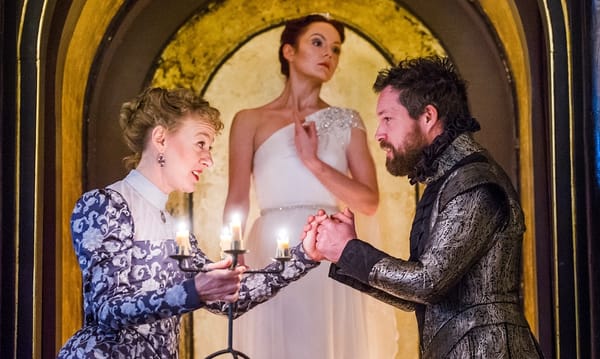On the shoulders of literary giants
David Mitchell and Kazuo Ishiguro discuss ghosts, action and what they avoid writing

It was an odd set-up – the 2500-seater Royal Festival Hall packed to the brim, eagerly watching just two individuals on stage. Sat slightly angled towards each other and separated by an unassuming coffee table were two of the greatest literary figures of our time. I was seated right at the back (everything else was sold out), and their figures were dwarfed by the massive screen behind them with their names emblazoned across. Kazuo Ishiguro and David Mitchell may be the only two people on a vast stage regularly used for entire orchestras or dance troupes, but their presence filled the space around them and commanded the attention of rows upon rows of fans, writers, geeks and the curious.
Clearly, their words have touched the lives of many. Being a passionate fan of Kazuo Ishiguro’s books, I had eagerly signed up for the event entirely because of him without actually realizing who David Mitchell was. I mean, I’ve watched Cloud Atlas, but I am ashamed to say that I have never actually read any of his books. On the other hand, I count Ishiguro’s Booker prize-winning novel Remains of the Day as one of the books that have changed my worldview, and his short story collection Nocturnes completely overturned my ideas of the magic that can be done with beautiful language.
However, this event turned out to be exceedingly fruitful precisely because of the dialogue between the two arguably similar but ultimately very different writers. Mitchell describes his first book promotion event abroad where he was pleasantly surprised to find an impressive crowd, only to learn that they were all there for Ishiguro, who was also at the event. He is fifteen years younger than Ishiguro, but the two are good friends, often sending each other manuscripts for comments and exchanging ideas over the telephone. At one point, Mitchell talks about how the multiplayer board game Dungeons and Dragons inspired him as a child – to which Ishiguro replied that he had mentioned the game to him before, but he had no idea what it was because he was probably too old!
Friendly banter permeated much of their conversation, which was split into three sections, each preceded by a clip. Since the event was titled “Among Giants and Ghosts”, it was only appropriate that the first clips were from the films Sixth Sense and The Innocent. Interestingly, they disagreed fundamentally on what they found scary about ghosts – Mitchell narrated a story his brother told him as a kid, about a misplaced liver and his grandfather’s ghost. Ishiguro, however, contended that that was more horror, which he thought was distinct from eerie, fear-inducing beings and events. Horror didn’t scare him – what he found scary was simply the existence of the supernatural, a being at the edge of reality.
To Ishiguro, ghosts show that “our control over the world is not complete”, and that was what scared him. Writing, then “unleashes this force or power”. “Do you write because you want to create something out of nothing, then?” Mitchell asks. Ishiguro’s stories often deal with characters that are struggling with ghosts within themselves, or the ghosts of decisions that they have made. Living in Lord Darlington’s estate long after its days of glory, Stevens from Remains is constantly haunted by the mistakes of his past.
Ishiguro’s characters often struggle with ghosts within themselves
The second clip was from a samurai comedy film, where two samurai stare at each other, tension building up palpably without any movement at all, until both of them slash across at the same time. Ishiguro points out that Mitchell is far more acquainted with writing action scenes than he is, and the pair went on to discuss the value of writing about action, considering that films can do a far more vivid job. Mitchell points out that it is the build-up to the fight that makes or breaks the game in writing action, not the exchange of blows itself. Raising the example of War and Peace, Ishiguro adds that writing also allows one to move more effectively between the micro and macro aspects of the action.
At one point, Ishiguro brought up that he found Mitchell “remarkably fearless as a writer, perhaps even reckless”.
Despite keeping a notebook of ideas, Ishiguro said that most of them didn’t end up anywhere as he found it greatly uncomfortable to write outside of his personal experience, almost like he did not have a right to.
“Do you hesitate in the same way?” he asked Mitchell, who replied that he had a point of writing books that are quite different from one another, and in that process he tends to veer into the unfamiliar. However, both agreed that there are certain cultural and political areas that they felt compelled to avoid, because the right to write them “had to be earned” – such as African American literature being so richly filled by native writers.
Perhaps this avoidance of real history stems from a fear of misrepresenting the past and doing injustice to real tragedy. I do not personally see anything wrong with appropriating history in works of fiction, if a particular time or event suits the creative plot one has in mind. No one bills novels as history books, and there is no obligation to be accurate, after all.
It was a great pleasure listening to two great writers chat, on this whirlwind tour across a range of issues. I will never cease to be amazed by the capacity of human imagination that creates words and images so elaborate and beautiful that speaks to so many people at once. “Among Giants and Ghosts” is an appropriate title not only because of the discussion of ghosts and fantasy, but because these are two giants of contemporary literature.








